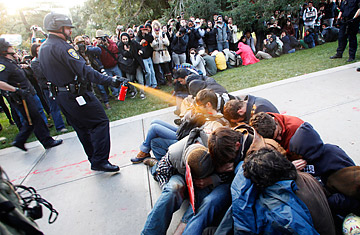
University of California, Davis, Police Lieutenant John Pike uses pepper spray to move Occupy UC Davis protesters while blocking their exit from the school's quad on Friday, Nov. 18, 2011
When campus police demanded that 21-year-old Sophia Kamran and her fellow protesters dismantle the tents they had pitched on the quad at the University of California, Davis, to protest tuition increases, they refused. Instead, as online videos of the incident depict, they sat peacefully with arms crossed as officers marched up to the protest line, one brandishing a can of pepper spray before dousing students with it repeatedly at point-blank range. Protesters who covered their faces were sprayed under their shirts, and Kamran says one student vomited profusely after being sprayed directly in the mouth. "It was such an intense feeling. It felt like acid was being poured on our faces," says Kamran, a philosophy and comparative-literature major. "I was basically immobile and in a lot of pain."
The Nov. 18 pepper-spraying — videos of which quickly went viral over the weekend after appearing online — seems to have only emboldened Occupiers at Davis, and some say it may fortify similar protests across the U.S. In Davis, demonstrators are using the well-publicized incident to focus attention on their pleas to end tuition hikes and to bring an end to heavy-handed police action at student protests. Students say they now expect thousands of people to show for a rally and general assembly on Monday, Nov. 21, at which they will call for the resignations of the school's chancellor and the UC Davis police chief. If Chancellor Linda Katehi declines, students plan to force the issue at an upcoming meeting of the UC regents. "Students are much more engaged right now than we've ever seen," says Nick Perrone, a graduate student and union organizer who is part of the movement at Davis. "I've heard from faculty that they've never seen Davis activated the way it is today."
Katehi says she has no intention of resigning. She said Sunday that two university police officers had been put on leave and that she would speed up an investigation of the episode. Katehi, who declined an interview request, said in a statement that she felt students' "outrage" and called the use of pepper spray "chilling." Still, she says she made the decision to forbid the camping protesters from remaining in the area because they were violating university rules and posed both safety and health concerns. Police chief Annette Spicuzza, who didn't return requests for comment, has reportedly said the officers decided to use pepper spray because students encircled them. University of California president Mark Yudof, meanwhile, said he was "appalled" at the images of the confrontation.
Students' outrage at being pepper-sprayed is understandable. What makes the fallout from this altercation a watershed moment at Davis is the level of engagement by the faculty. Teachers have come out in support of the movement, some strongly echoing the students' demands for the chancellor to resign. "You are unfit to ensure the safety of students at UC Davis," Nathan Brown, an assistant professor of English, said in an open letter — a scathing rebuke that was circulated widely on the Internet Saturday. "In fact: you are the primary threat to the safety of students at UC Davis. As such, I call upon you to resign immediately." Bob Ostertag, a professor of technocultural studies and music, said in an op-ed that this incident and others, including a protest at UC Berkeley at which police allegedly hit students with batons, were evidence of an increased militarization of the state's police forces. "These are not trivial matters," Ostertag wrote. "This is a moment to stand up and be counted. I am proud to teach at a university where students have done so."
Even professors who aren't taking a leadership role in the movement expressed their shock. "There is absolute unity among faculty that this incident we've all witnessed was an outrage," says Ari Kelman, a history professor who stresses that he was merely an observer of the events. Some say that such faculty and student fury follows a mounting sense of discontentment on campus about tuition hikes. "There's been a sense of profound dissatisfaction and even dismay that's been bubbling under the surface, and this episode seems like it's just become the flash point," Kelman says.
While protesters at Davis stress that their movement isn't the same as Occupy Wall Street because they're focusing on other issues than an anti-big-bank platform, their furor comes at a pivotal time for Occupiers across the U.S. First, the Davis incident amplifies the uncertainty among authorities nationwide as to what use of force is warranted in response to nonviolent protesters. But more important, as the Occupy movement aims to regroup following the raids of encampments in several cities, the online reactions to the pepper-spray episode may give protesters in other cities a boost of confidence — that even a traditionally quiet campus like Davis can be whipped into an uproar and that faculty can be inspired to join the cause. "Davis is a pretty sleepy place, and it's a pretty happy place," Kelman says. "There's a sense of turmoil right now that's quite unusual."
